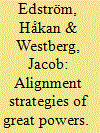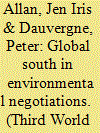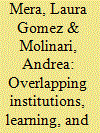|
|
|
Sort Order |
|
|
|
Items / Page
|
|
|
|
|
|
|
| Srl | Item |
| 1 |
ID:
188347


|
|
|
|
|
| Summary/Abstract |
The article aims to contribute to previous research in two main ways. First, we intervene in the debate on the stability of the present unipolar system by offering an analytical framework and an empirical approach for exploring and categorizing the actual strategies pursued by the major powers in the contemporary international system. In doing so, we present an analysis of how the strategies of the five system-determining states interact and affect the stability of the system. Second, in order to be able to explain why states pursue different strategies, we complement the analytical framework of structural realism with insights from research on Power Transition Theory (PTT). Hereby, we offer a new comprehensive theoretical approach for analyzing how asymmetric power relations affect strategic choices of major powers.
|
|
|
|
|
|
|
|
|
|
|
|
|
|
|
|
| 2 |
ID:
131624


|
|
|
|
|
| Publication |
2014.
|
| Summary/Abstract |
European Union (EU) interventions in conflict countries tend to focus on governance reforms of political and economic frameworks instead of the geopolitical context or the underlying power asymmetries that fuel conflict. They follow a liberal pattern often associated with northern donors and the UN system more generally. The EU's approach diverges from prevalent governance paradigms mainly in its engagement with social, identity and socio-economic exclusion. This article examines the EU's 'peace-as-governance' model in Cyprus, Georgia, Palestine and Bosnia and Herzegovina. These cases indicate that a tense and contradictory strategic situation may arise from an insufficient redress of underlying conflict issues.
|
|
|
|
|
|
|
|
|
|
|
|
|
|
|
|
| 3 |
ID:
124177


|
|
|
|
|
| Publication |
2013.
|
| Summary/Abstract |
During international environmental negotiations developing countries have commonly employed a unified strategy through the G-77 and China (G-77/China). Compared with other negotiations, such as those on trade and security, this strategy has been relatively successful in securing financial and technical benefits. Unity among developing states is not, however, a characteristic of all environmental negotiations. This paper analyses the case of Reducing Emissions from Deforestation and Degradation plus conservation ( redd +), where unity has been absent. It argues that the negotiation positions, strategies and coalition politics from 2005 to 2013 have been a result of identifiable power asymmetries among developing states (shifting over time). Some states with vast forest resources have held an effective veto, while others have had considerable moral influence and expert authority. Coalitions have courted such relevant and reputational leaders. At the same time some developing states have had enough diplomatic capacity and economic power to stand alone in negotiations. Taking a broad, historical view of the diverse forest interests and power asymmetries among developing states helps to explain the recent stagnation in negotiations to establish an international redd+ mechanism to mitigate climate change.
|
|
|
|
|
|
|
|
|
|
|
|
|
|
|
|
| 4 |
ID:
133645


|
|
|
|
|
| Publication |
2014.
|
| Summary/Abstract |
This article studies the functioning of dispute settlement mechanisms in regional trade agreements (RTAs) and their interaction with multilateral trade institutions. We examine the determinants of formal dispute initiation in RTAs among South American countries. Using an original data set of RTA disputes, we investigate the impact of economic power disparities, domestic political factors, and previous experience on the decision of South American countries to initiate a dispute against a regional trade partner. Our analysis indicates that both power asymmetries and domestic political factors influence the likelihood of dispute initiation at the regional level. We also find strong support for our hypothesis that previous experience in dispute settlement increases the probability that a country will file a complaint against a regional trade partner using regional mechanisms. Perhaps more interestingly, our empirical analysis also uncovers important cross-institutional effects. Prior participation in WTO disputes increases the propensity of states to file complaints at the regional level.
|
|
|
|
|
|
|
|
|
|
|
|
|
|
|
|
|
|
|
|
|